#justice Elena Kagan
Text
Jamelle Bouie does a good job of underscoring just how fed up Justice Elena Kagan is with the decisions coming from the right-wing justices on the court, and why she questions the constitutionality of Roberts' majority opinion in Biden v. Nebraska (the student loan forgiveness case). Here are some excerpts from Bouie's NY Times newsletter:
But I don’t want to discuss Roberts’s majority opinion [in Biden v. Nebraska] as much as I do Justice Elena Kagan’s dissent. Kagan wrote something unusual. She didn’t just challenge the chief justice’s reasoning, she questioned whether the court’s decision was even constitutional.
“From the first page to the last, today’s opinion departs from the demands of judicial restraint,” Kagan wrote. “At the behest of a party that has suffered no injury, the majority decides a contested public policy issue properly belonging to the politically accountable branches and the people they represent.”
She continued: “That is a major problem not just for governance, but for democracy too. Congress is of course a democratic institution; it responds, even if imperfectly, to the preferences of American voters. And agency officials, though not themselves elected, serve a President with the broadest of all political constituencies. But this Court? It is, by design, as detached as possible from the body politic. That is why the Court is supposed to stick to its business — to decide only cases and controversies, and to stay away from making this Nation’s policy about subjects like student-loan relief.”
The court, Kagan concluded, “exercises authority it does not have. It violates the Constitution.”
[...]
Kagan’s dissent, in other words, is a call for accountability. For Congress, especially, to exercise its authority to discipline the court when it oversteps its bounds.
Democrats may or may not get this particular message. But John Roberts heard it loud and clear. “It has become a disturbing feature of some recent opinions to criticize the decisions with which they disagree as going beyond the proper role of the judiciary,” he wrote in his opinion. “It is important that the public not be misled either. Any such misperception would be harmful to this institution and our country.”
For Roberts, the problem isn’t that the Supreme Court is overstepping its bounds, it’s that one of its justices has decided that she’s had enough.
[emphasis added]
#justice elena kagan#chief justice john roberts#biden v nebraska#lack of standing#unconstitutional supreme court ruling#student loan forgiveness#jamelle bouie#the new york times
134 notes
·
View notes
Text
The U.S. Supreme Court on Tuesday seemed likely to uphold a federal law that bans gun possession for anyone subject to a domestic violence court order. If so, the decision would be a small retreat from the court's sweeping decision on gun rights last year.
From the outset Tuesday, the Justices wrestled with the consequences of their far-reaching 2022 decision, declaring that in order for a gun law to be constitutional, it has to be analogous to a law that existed at the nation's founding in the late 1700s. The question Tuesday was how precise that analog has to be.
DANGEROUS VS. RESPONSIBLE
Solicitor General Elizabeth Prelogar, representing the government, told the Justices that under the court's most recent decisions, including last year's, Congress may disarm those who are not law-abiding, responsible citizens.
"There is no historical evidence" that the Second Amendment "was originally understood to prevent legislatures from disarming dangerous individuals," she said.
But, as several Justices noted, people do all kinds of irresponsible things — driving over the speed limit, putting the trash out on the wrong day — but nobody would suggest they lose their constitutional rights for that. Pressed by Chief Justice John Roberts, Prelogar agreed that the word responsible is "something of a placeholder for dangerousness."
"There's no daylight at all then between not responsible and dangerous?" Justice Brett Kavanaugh asked. No daylight, Prelogar agreed, adding that "our understanding of what history and tradition reflect ... is those whose possession of firearms presents an unusual danger beyond the ordinary citizen."
"Why did you use the term 'responsible' if what you meant was dangerous?" Roberts asked.
"Well, we relied on the same phrasing the Court itself used when it first articulated" the right to bear arms principle in 2008, she replied.
Most of the Court's conservatives seemed to accept that proposition, with only Justices Samuel Alito and Clarence Thomas remaining skeptical. Thomas was the author of last year's broad decision — a decision so expansive and unspecific that the lower courts have interpreted it in dramatically different ways. As Justice Elena Kagan observed, "There seems to be a fair bit of division, and a fair bit of confusion about what Bruen [last year's case] means and what Bruen requires of the lower courts."
BACKGROUND TO THE CASE
Challenging the federal law in Tuesday's case was Zackey Rahimi. A Texas judge stripped him of his license to have guns when it granted a domestic violence court order after Rahimi allegedly assaulted his girlfriend in a parking lot, and then fired a gun at a bystander who saw the assault. After he continued firing guns in public, even after the court order, police searched his residence and found guns, magazines and ammunition. He was sentenced to six years in prison for violating the federal law that bans domestic abusers under court order from possessing guns.
Rahimi, however, continued to press his challenge to the federal law, and the Fifth Circuit Court of Appeals, citing the Supreme Court's 2022 ruling, declared the law unconstitutional.
Rahimi's lawyer, federal public defender Matthew Wright, struggled to defend that decision Tuesday, telling the Justices there is no law from the founding era that is analogous to this one.
"There's no history of [gun] bans. They don't exist," Wright told the court.
Justice Kagan asked if the presence of a similar ban at the time of the founding is essential after the court's decision last year in the Bruen case. If there isn't a similar ban from the founding era, "we say that the government has no right to do anything?" she asked incredulously.
"That's largely what Bruen says," Wright replied.
Wright also maintained that those accused of domestic violence have few protections in court prior to being slapped with a ban on guns.
Justice Amy Coney Barrett wasn't buying that, noting that Rahimi's ex-girlfriend "did submit a sworn affidavit giving quite a lot of detail about the various threats. It's not like he just showed up and the judge said 'credible finding of violence.'"
Roberts was even more direct, asking, "You don't have any doubt that your client is a dangerous person, do you?"
Wright replied, "I would want to know what dangerous person means."
"Someone who is shooting at people," Roberts shot back.
"That's fair," a sheepish Wright conceded.
Kagan followed up: "Do you think the Congress could disarm people who are mentally ill, who've been committed to mental institutions?"
"I think maybe," Wright answered, prompting this from Kagan: "I will tell you the honest truth, Mr. Wright. I feel like you are running away from your argument because the implications of your argument are just so untenable that you have to say 'no, that is not really my argument.'"
Indeed, the Court's decision in the Rahimi case will have ripple effects. It may make lower courts more hesitant to strike down laws aimed at preventing dangerous people from having guns.
But as several Justices said Tuesday, this is the easy case. The harder ones lie ahead, among them: federal and state laws that bar convicted felons — even those convicted of non-violent crimes — from having guns.
#us politics#news#npr#us supreme court#second amendment#2nd amendment#gun rights#gun reform#gun regulation#domestic violence#domestic abusers#Elizabeth Prelogar#Justice John Roberts#Justice Brett Kavanaugh#Justice Samuel Alito#justice clarence thomas#Justice Elena Kagan#New York State Rifle & Pistol Association Inc. v. Bruen#Zackey Rahimi#Texas#Fifth Circuit Court of Appeals#Justice Amy Coney Barrett#Matthew Wright#founding fathers#gun bans#2023
11 notes
·
View notes
Text

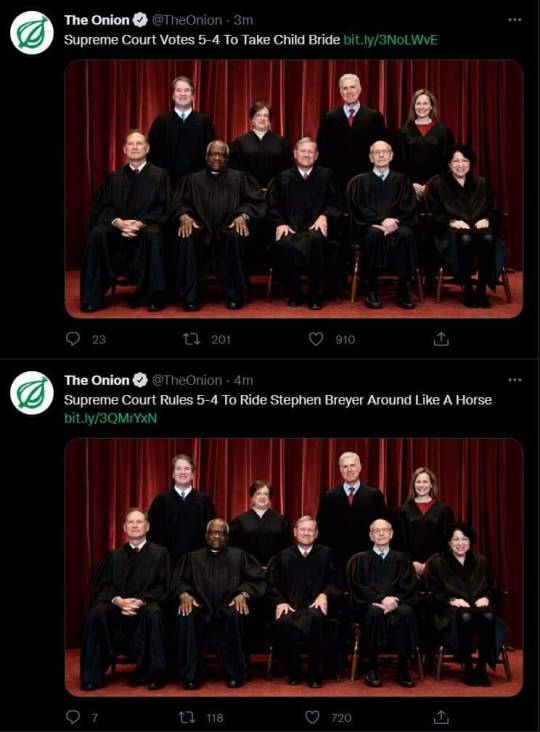


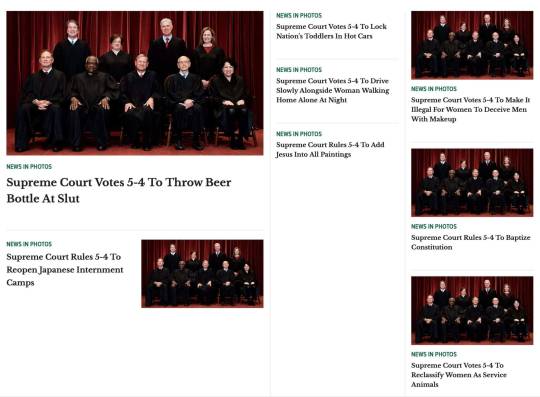
#us politics#the onion#us supreme court#scotus#news#fuck republicans#justice stephen breyer#justice brett kavanaugh#justice clarence thomas#justice amy coney barrett#justice antonin scalia#justice sonia soromayor#justice elena kagan#justice neil gorsuch#chief justice john roberts#justice john roberts#scotus be like
150 notes
·
View notes
Text

#us politics#news#politico#us supreme court#scotus#roe v wade#Justice Samuel Alito#planned parenthood#Planned Parenthood v. Casey#justice clarence thomas#justice neil gorsuch#justice brett kavanaugh#justice amy coney barrett#justice stephen breyer#justice Sonia Sotomayor#justice Elena Kagan#Dobbs v. Jackson Women’s Health Organization#us constitution#Justice Ruth Bader Ginsburg#laurence tribe#14th amendment#us history#2022#biden administration#abortion is better than negligence#abortion is a human right#abortion is a right#abortion is not a crime#abortions#abortion bans
4 notes
·
View notes
Text
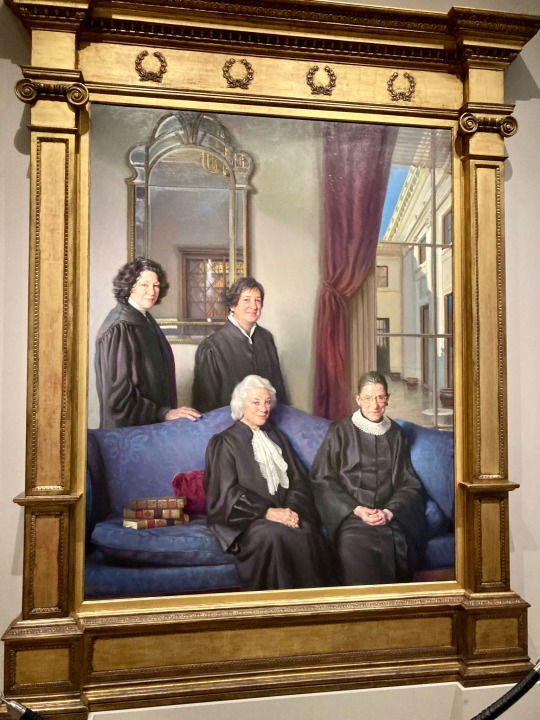
#portrait#Supreme Court#female Supreme Court justices#Ruth Bader Ginsburg#Sandra Day O’Connor#Sonia Sotomayor#Elena Kagan#National Portrait Gallery#Smithsonian#Washington DC
0 notes
Text
Shame on the Appeals Court - 03/20/2024
Late yesterday, the 5th Circuit Federal Appeals Court blocked Texas with a temporary injunction from enforcing their SB4 law which would allow Texas to arrest and deport migrants who enter their state illegally. Earlier yesterday, the SCOTUS (Supreme Court of the United States) issued an emergency appeal to remove a previous stay that was blocking SB4, a huge win for Texas. I didn't know that a Supreme Court appeal could be blocked by a lower Federal Court of Appeals, and they did so in the same day, crazy. So, Texas went from celebrating a victory for border security, to going back to being angrily frustrated at not being able to stop the stampede of illegal crossings. The 5ht circuit is entertaining arguments today on whether to stay the injunction, pending the outcome of an appeal at the SCOTUS.
“A majority of the panel has concluded that the administrative stay entered by a motions panel on March 2, 2024, should be lifted,” the unsigned order by the court reads. Yesterday, on March 19th, circuit judge Andrew Oldman disagreed: “I would leave that stay in place pending tomorrow’s oral argument on the question.” That was just hours after the SCOTUS had rejected an emergency request from the Biden jackasses to look at the administrative stay directed by the 5th Circuit's prior panel. The DOJ's (Department of Justice) stance on the law is that it violates the Constitution's Supremacy Clause which declares that states do not have the right to enforce immigration laws.
As per usual with emergency appeals, the Supreme Court did not give a reason for issuing their order. Justices Brett Kavanaugh and Amey Coney Barrett issued aligning opinions. Barrett wrote on regarding actions of the high court: “never reviewed the decision of a court of appeals to enter—or not enter—an administrative stay.” She continued, that it is “unwise to invite emergency litigation in this Court about whether a court of appeals abused its discretion at this preliminary step.”
Liberal justices Sonia Sotomayor, Elena Kagan, and Ketanji Brown Jackson had dissenting opinions. Sotomayor said the order “invites further chaos and crisis in immigration enforcement.” She went on to write that the law “upends the federal-state balance of power that has existed for over a century, in which the National Government has had exclusive authority over entry and removal of noncitizens.” - I say, bullstit! States have always had the legal right and shared responsibility for protecting their sovereignty. Yesterday, the Mexican government said that it will not accept any illegal migrants coming back to them no matter what. They said that anyone deported who is not a Mexican citizen does not have to be accepted by them.
All governor Abbott wants to do is to enforce the laws to keep his state safe and secure, and the Biden commies are doing everything they can to impede that. It's disgusting! Will this nightmare ever end? I sure hope so.
#fifth circuit#5th circuit#court of appeals#scotus#justices#sb4#temporary injunction#stay#brett kavanaugh#amy coney barrett#sonia sotomayor#elena kagan#judges#supreme court#us supreme court#greg abbott#texas#texas governor#governor abbot#abbott#secure border#border#illegal immigrants#stampede#invasion#illegals#biden administration#commies#jackasses#texas border
0 notes
Text
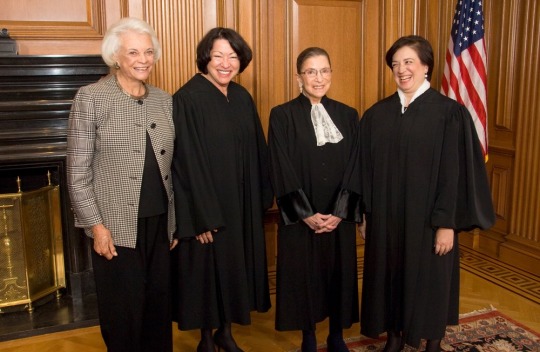
The First Four Women Supreme Court Justices: Sandra Day O'Connor, Sonia Sotomayor, Ruth Bader Ginsburg, and Elena Kagan, October 1, 2010. photographer Steve Petteway, the Supreme Court of the United States
On Being the First Woman on the Supreme Court of The United States
A friend and former law clerk of Sandra Day O’Connor reflects on her pioneering career.
— September 10, 2021 | Ruth McGregor
The Nomination
I was driving to work. On my car radio I heard President Reagan, and he’s saying, “She is truly a person for all seasons.” But I had missed the first part of it where he said the name of the person he was nominating, and he didn’t say her name again throughout his remarks. So after he finished this short statement, somebody came on, one of the commentators, and said who he had nominated.
And I just burst into tears. I pulled my car off to a side street and just sat there and cried for a while until I could get back under control and drive to work.
I think the women hoped that she would be a voice for women’s rights, that she would be a voice against discrimination against women and other protected groups. I think women expected that she would be supportive of women’s groups and issues. And she was.
She was always, in my experience, very much in favor of women being given equal opportunities. She was always very much in favor of the laws that gave women equal employment opportunities, equal credit opportunities. She was very supportive of women’s bar associations and the National Association of Women Judges. She was always willing to lend her time and her name and support for those things.
Discrimination and Access
She liked to say that she didn’t feel she had been discriminated against, and yet, when you hear her tell her stories about the way she was treated by fellow state senators, it’s obvious that she was. [It] was obvious to her. Her classmate Bill Rehnquist is clerking for the United States Supreme Court, and she’s working initially for no money for a county attorney’s office.
People wouldn’t interview her and hire her. So on some level, she expected to be treated fairly with the men, but she got a real education in that she would not be pretty early on. So it seems clear to me that she was discriminated against. It’s not really surprising, when you think about how she was raised, that she came with the expectation that hard work and ability would overcome any other potential problems.
Growing up on [a] ranch she was treated equally. She was expected to do the same things that the men on the ranch did. She was expected to be able to hold up her end of the bargain. She was expected to be able to help with roundups and whatever it was that needed to be done.
She grew up in Eastern Arizona, went to school in Texas, and the West was different in its view of women and the value of women than some parts of the country. Arizona was a community property state, women had some property rights that people in common law states didn’t have, and it was much more an even playing field. So she grew up in an atmosphere where she was expected to do the same and was treated much the same.

Sandra Day O'Connor, 1982. Credit: National Portrait Gallery, Smithsonian Institution, Michael Arthur Worden Evans.
Commitment to Fairness
She did so much for so many people to help them along the way, to encourage them, to push them, to make opportunities where she could, to remind people that there needed to be women on commissions and committees. A lot of what she did probably no one saw, because it was when she was meeting with people and saying, “I don’t see any women in this room,” and then they would go find some women to be part of the group.
She of course didn’t like to call herself a feminist, although in my view, she clearly was. There’s no question. She believed women should be able to be on an equal footing with men. The most basic tenant of feminism. I think the reason she didn’t say she was a feminist was because her view of a feminist was somebody who was demonstrating in the streets.
If you take away that kind of stereotype of feminists in the 1970s, then you look to see what was the role of the women’s movement? It was to remove barriers to women so that they were able to do what they wanted to do. It was to remove barriers within employment, within education, and all of those things were things that she had found a way around without the benefit of the laws that helped women later. Nothing would frustrate her more than to suggest a woman wasn’t able to do a job, because that’s not the way she was raised. It’s not the way she lived her life. It’s not the way she acted.
She did become noted for the diversity of her law clerks, and this obviously was a very deliberate act on her part. She noted—and it’s pretty obvious—that almost all the law clerks come from just a few law schools. Almost all the law clerks come from just a few circuit court judges. And she knew there were a lot of other people out there who were qualified to work as a clerk at the Supreme Court.
So she broadened the law schools that she hired law clerks from. She brought in more women as law clerks. More diversity in terms of physical ability. I think this is something that people don’t understand totally about her when they ask about her views toward discrimination. Her view simply was that nobody should be prevented ever from doing something they’re qualified to do. Whether it was women, whether it was African-Americans, whether it was Hispanics, nobody should be disqualified from doing something because of a particular characteristic. And that was just as clear to her as anything ever could be.
So it’s not surprising that she found a way to add more diversity to her law clerks, because she was in a unique position to give people an opportunity that really would help them in their later career. Being a Supreme Court law clerk is a big advantage to people, and I really always thought she just couldn’t bear the notion that some people couldn’t reach their full ability. And so if she could do something to move it along, she would.
From her opinions and what she wrote, you can see her attempt to come to a standard that she thought was both applicable and protective of all the parties involved in that decision. Her opinions were for the most part limited to the issues that came to the Court. She regarded that as the appropriate approach for the Court to take, not to make broad, sweeping generalizations, but to decide the case before them.
— Our interview with Ruth McGregor has been edited for clarity. McGregor was Justice O'Connor's former clerk at the Supreme Court in 1981 and a longtime friend.
#The First Four Women Supreme Court Justices#Sandra Day O'Connor | Sonia Sotomayor | Ruth Bader Ginsburg | Elena Kagan#The Supreme Court of the United States 🇺🇸#NOVA | PBS
1 note
·
View note
Text
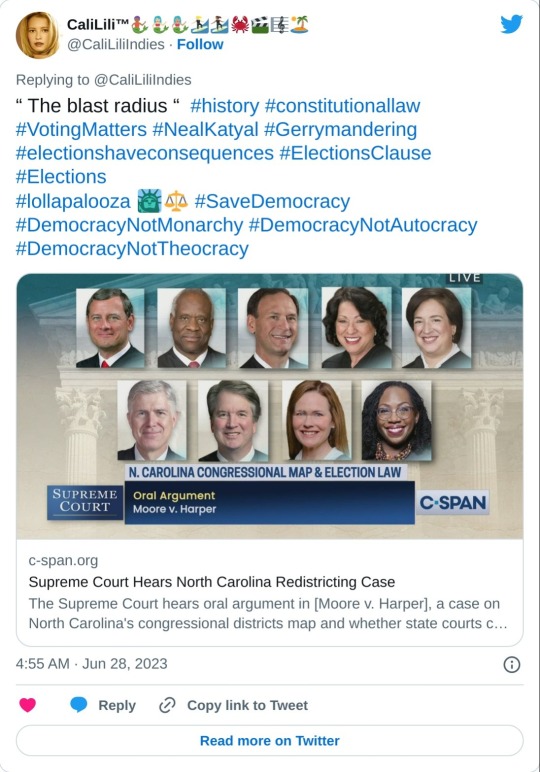
#sotomayor#soniasotomayor#justicesotomayor#elenakagan#sonia sotomayor#elena kagan#justicekagan#ketanji brown jackson#justice ketanji brown jackson#justiceketanjibrownjackson#scotus#elections matter#votingmatters#nealkatyal#neal katyal#law#legalnews#rights#your rights#votebluetoprotectyourrights#gerrymandering#checks and balances#4th of july#independence#blastradius#history#historic#epic#musthear#supremecourt
1 note
·
View note
Text
Congress Fails To Adopt Important Immigration Legislation
Congress Fails To Adopt Important Immigration Legislation
Previous posts documented Congress’ earlier failure this Session to adopt (a) the Afghan Adjustment Act to improve the legal status of Afghan evacuees in the U.S. and (b) important bipartisan immigration reform, one of which was offered by Senators Kyrsten Sinema (ex-Democrat & now Independent) and Thom Tillis (Rep., NC) that would have addressed the legal fate of so-called Dreamers and provided…
View On WordPress
#Afghan Adjustment Act#Deferred Action for Childhood Arrivals (DACA)#Greisa Martinez Rosas#Homeland Security Secretary Alejandro Mayorkas#Omnibus Bill#President Joe Biden#Title 42#Trump Administration#U.S. Chief Justice John Roberts#U.S. Department of Homeland Security#U.S. Justice Amy Barett#U.S. Justice Bret Kavanaugh#U.S. Justice Clarence Thomas#U.S. Justice Elena Kagan#U.S. JUstice Ketanji Jackson#U.S. Justice Neal Gorsuch#U.S. Justice Samuel Alito#U.S. Justice Sonia Sotomayor#U.S. Senator Kyrsten Sinema#U.S. Senator Mike Lee#U.S. Senator Tester#U.S. Senator Thom tillis#United We Dream#Wall Street Journal#White House Press SecretaryKarine Jean-Pierre
0 notes
Quote
The three justices from the court’s liberal wing strongly objected to this, and Justice Amy Coney Barrett objected less forcefully. Each of the four indicated that the court need not have gone that far.
The concurrence from Justices Sonia Sotomayor, Elena Kagan and Ketanji Brown Jackson is full-throated on this point.
They agreed that allowing Colorado to disqualify Trump would lead to “chaos,” but they disagreed that congressional enforcement was “critical” to the 14th Amendment. And they suggested the court’s majority was insulating both Trump and other alleged insurrectionists.
They said the five justices “decide novel constitutional questions to insulate this Court and petitioner” — Trump — “from future controversy.”
“By resolving these and other questions, the majority attempts to insulate all alleged insurrectionists from future challenges to their holding federal office,” the three justices wrote.
Takeaways from Supreme Court's Trump-14th Amendment ruling
I struggle to accept that anyone who was involved in writing the 14th Amendment would look at Trump, January 6, and everything he has said and done around it, would conclude that he is not the kind of person they were thinking about when they drafted it.
It seems like everyone, from Moscow Mitch to the activist SCOTUS, refuses to use the powers granted to them by the constitution to protect and defend America from people like Trump. Whether that’s because they agree with his policies, or they are just feckless cowards who are so insulated from the consequences of their actions they don’t have to live with them, the result is the same.
Why won’t any of these people use the tools and the powers they have been granted — tools the vast majority of Americans *want* them to use — to wake us from this nightmare?
545 notes
·
View notes
Text
The Supreme Court on Friday invalidated President Joe Biden’s student loan debt relief plan, meaning the long-delayed proposal intended to implement a campaign trail promise will not go into effect.
The Justices, divided 6-3 on ideological lines, ruled in one of two cases that the program was an unlawful exercise of presidential power because it had not been explicitly approved by Congress.
The court rejected the Biden administration's arguments that the plan was lawful under a 2003 law called the Higher Education Relief Opportunities for Students Act, or HEROES Act. The law says the government can provide relief to recipients of student loans when there is a “national emergency,” allowing it to act to ensure people are not in “a worse position financially” as a result of the emergency.
Chief Justice John Roberts said the HEROES Act language was not specific enough, writing that the Court's precedent "requires that Congress speak clearly before a department secretary can unilaterally alter large sections of the American economy."
The plan, which would have allowed eligible borrowers to cancel up to $20,000 in debt and would have cost more than $400 billion, has been blocked since the 8th U.S. Circuit Court of Appeals issued a temporary hold in October.
About 43 million Americans would have been eligible to participate.
The student loan proposal is important politically to Biden, as tackling student loan debt was a key pledge he made on the campaign trail in 2020 to energize younger voters.
The ruling will immediately put pressure on the Biden administration to find an alternative avenue to forgive student debt that could potentially withstand legal challenge.
Advocates, as well as some Democrats in Congress, say the Education Department has broad power to forgive student loan debt under the 1965 Higher Education Act, a different law to the one at issue in the Supreme Court cases.
Separately, the student loan repayment process is set to begin again at the end of August after having been put on pause during the COVID-19 pandemic, although first payments will not be due until October.
The court considered two cases: one brought by six states, including Missouri, and the other brought by two people who hold student loan debt, Myra Brown and Alexander Taylor. The court ruled that the program was unlawful in the case brought by states but found in the second case that the challengers did not have legal standing.
The three liberal Justices on the conservative-majority bench dissented, with Justice Elena Kagan saying that by ruling against the plan, the Court had "exceeded its proper limited role in our nation's governance."
She said the states bringing the challenge did not have legal standing to even bring the case, and in analyzing HEROES Act, the conservative Justices ignored the clear language of the law.
"The result here is that the Court substitutes itself for Congress and the executive branch in making national policy about student-loan forgiveness," Kagan wrote.
The Court decided the case in part based on a legal argument made by the challengers that the conservative majority has recently embraced called the “major questions doctrine.”
Under the theory, federal agencies cannot initiate sweeping new policies that have significant economic impacts without having express authorization from Congress.
The conservative majority cited the major questions doctrine last year in blocking Biden’s COVID vaccination-or-test requirement for larger businesses and curbing the authority of the Environmental Protection Agency to limit carbon emissions from power plants.
The challengers argued that the administration’s proposal — announced by Biden in August and originally scheduled to take effect last fall — violated the Constitution and federal law, partly because it circumvented Congress, which they said has the sole power to create laws related to student loan forgiveness.
Biden had proposed canceling student loan debt during the 2020 presidential election campaign.
The administration ultimately proposed forgiving up to $10,000 in debt for borrowers earning less than $125,000 a year (or couples who file taxes jointly and earn less than $250,000 annually). Pell Grant recipients, who are the majority of borrowers, would be eligible for $10,000 more in debt relief.
The administration closed the application process after the plan was blocked. Holders of student loan debt currently do not have to make payments as part of COVID relief measures that will remain in effect until after the Supreme Court issues its ruling.
The nonpartisan Congressional Budget Office estimated in September that Biden’s plan would cost $400 billion.
#us politics#news#nbc news#2023#student debt relief#student debt forgiveness#student loan debt#student loan forgiveness#president joe biden#biden administration#us supreme court#scotus#Higher Education Relief Opportunities for Students Act#HEROES Act#justice john roberts#8th circuit court of appeals#Higher Education Act#department of education#justice elena kagan#major questions doctrine#us constitution
10 notes
·
View notes
Text
Two things seemed clear after the Supreme Court heard oral arguments in Trump v. Anderson, the case concerning whether Section 3 of the Fourteenth Amendment bars Donald Trump from the presidency as an insurrectionist. First, most of the justices want to rule in Trump’s favor. Second, they’re struggling to figure out how to do so.
Maybe Section 3 doesn’t apply to the presidency per se, Justices Neil Gorsuch and Ketanji Brown Jackson said—and perhaps, along those same lines, it doesn’t prohibit oath-breaking former presidents from holding future office either? Or perhaps, Justice Samuel Alito pondered, the Fourteenth Amendment prohibits insurrectionists from holding office, but not from running for it? Justice Brett Kavanaugh seemed enamored of the idea that the amendment doesn’t allow states to disqualify candidates for federal office—as Colorado did here—without Congress first giving the go-ahead. In a related line of inquiry, which the justices seemed to coalesce around as arguments went on, Chief Justice John Roberts and Justice Elena Kagan suggested that perhaps there’s something inappropriate about allowing individual states to make decisions that could potentially determine a national election.
I do love the "something inappropriate about allowing individual states to make decisions that could potentially determine a national election." Perhaps there is something inappropriate about it but that is how the US election system works.
Gonna argue that our election system, like our immigration system, would be unacceptable to the vast majority of Americans for contradictory reasons if they understood how it worked so congressmen can campaign and judges rule based on totally imaginary ideas.
86 notes
·
View notes
Text
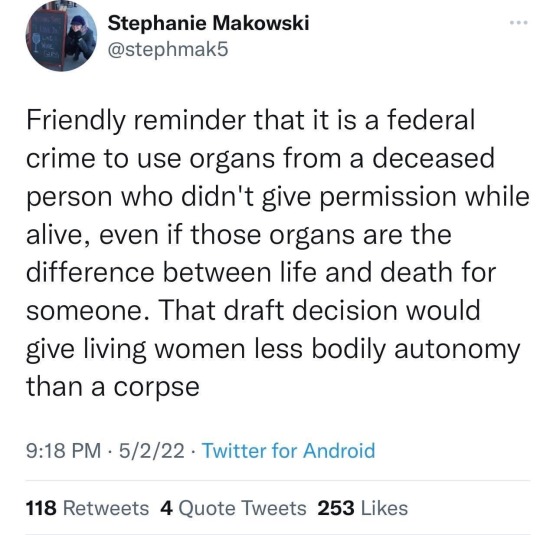
#us politics#news#politico#us supreme court#scotus#roe v wade#Justice Samuel Alito#planned parenthood#Planned Parenthood v. Casey#justice clarence thomas#justice neil gorsuch#justice brett kavanaugh#justice amy coney barrett#justice stephen breyer#justice Sonia Sotomayor#justice Elena Kagan#Dobbs v. Jackson Women’s Health Organization#us constitution#Justice Ruth Bader Ginsburg#laurence tribe#14th amendment#us history#2022#biden administration#abortion is better than negligence#abortion is a human right#abortion is a right#abortion is not a crime#abortions#abortion bans
4 notes
·
View notes
Text
Justice Sonia Sotomayor authored a dissenting opinion, joined by Justices Elena Kagan and Ketanji Brown Jackson. The dissenting opinion comprised 33 pages of the repeated phrase, "are you fucking serious" followed by the sounds of struggle as if two individuals were desperately trying to restrain a third individual.
290 notes
·
View notes
Text
BOTH PARTIES ARE THE SAME!!!, SCOTUS edition:
Clarence Thomas: appointed by George H.W. Bush (Republican)
Samuel Alito and John Roberts: appointed by George W. Bush (Republican)
Neil Gorsuch, Brett Kavanaugh, Amy Coney Barrett: appointed by Donald Trump (Republican)
Conservative total: 6
Sonia Sotomayor and Elena Kagan: appointed by Barack Obama (Democrat)
Ketanji Brown Jackson: appointed by Joe Biden (Democrat) replacing Stephen Breyer, appointed by Bill Clinton (Democrat), who also appointed Ruth Bader Ginsburg;
Liberal total: 3
Most common split on all these bad decisions: 6-3
Gee, it's almost like SCOTUS actually is incredibly important, Hillary Clinton and the entire mainstream Democratic electorate knew that in 2016, Democratic presidents consistently appoint the justices who are on the side of the rulings that you agree with, it was maybe a bad idea to let a man charged with 71 felony counts including criminal espionage appoint one-third of the current court, and yet BUH BUH BERNIE AND HER EMAILS.
#hilary for ts#politics for ts#hillary clinton was right about everything: the redux redux redux#i will never not once ever not be salty about this#and how the purity brigade and decades of GOP bile aimed at hillary#have gotten us to exactly this point that all of us with brains in our heads saw coming back in 2016#urrrrrrgh
205 notes
·
View notes
Text
S.V. Dáte at HuffPost:
WASHINGTON — A presidential order to the military to conduct a coup to keep him in office “might well be an official act,” Donald Trump’s lawyer told the Supreme Court Thursday on the question of whether Trump’s attempted coup is immune from prosecution.
The extraordinary exchange was among several in lengthy oral arguments before the justices, who will now decide whether the former president will stand trial on federal charges based on his actions leading up to the violent assault on the Capitol on Jan. 6, 2021.
Trump has been claiming that all his actions as president were “official acts” and therefore immune from prosecution entirely. While justices seemed skeptical of that assertion, most expressed concern that former presidents could be prosecuted in bad faith and for political reasons in the years to come.
“Reliance on the good faith of the prosecutor may not be enough,” Chief Justice John Roberts told Department of Justice lawyer Michael Dreeben.
“I take that concern,” added Justice Ketanji Brown Jackson. “I think it’s a real thing.”
How justices decide to protect future presidents from prosecutions based on their legitimate official actions could decide whether Trump faces a trial at all before the November election on the Jan. 6 indictment. If the court orders trial judge Tanya Chutkan to hold an evidentiary hearing to weed out the “official” components of Trump’s actions versus the ones for his private or political gain, that hearing and potential appeals of her ruling could consume many more months.
And if Trump wins back the White House, he could order prosecutors to drop all unresolved federal charges against him.
While Dreeben did not refer to the coming election at all, he repeated his boss special counsel Jack Smith’s request that the case be sent back to Chutkan with instructions that concerns about not punishing “official” acts be dealt with in jury instructions, rather than a separate hearing.
“We would like to present that as an integrated picture to the jury so that it sees the sequence and the gravity of the conduct and why each step occurred,” Dreeben said.
Trump’s lawyer, John Sauer, meanwhile came in for even more pointed questioning from most of the justices, but none more on point than Elena Kagan’s question about 40 minutes in.
“How about if the president orders the military to stage a coup?” Kagan asked.
“That might well be an official act,” Sauer answered.
Sauer also claimed that a presidential assassination of a political rival as well as the sale of nuclear secrets to a foreign power could also be defended as official acts immune from prosecution.
Trump was not at the Supreme Court during the oral arguments Thursday but rather was in a different courtroom, in lower Manhattan, in the early phase of an unrelated criminal trial.
During the oral arguments for the Trump v. United States presidential immunity case at SCOTUS on Thursday, Trump lawyer John Sauer told the court that even a military coup would be immune from prosecution as an "official act."
See Also:
HuffPost: Trump Lawyer Argues He Could Legally Order Assassination Of Political Rival
#SCOTUS#Trump v. United States#Capitol Insurrection#The Big Lie#John Sauer#Tanya Chutkan#Michael Dreeben
38 notes
·
View notes